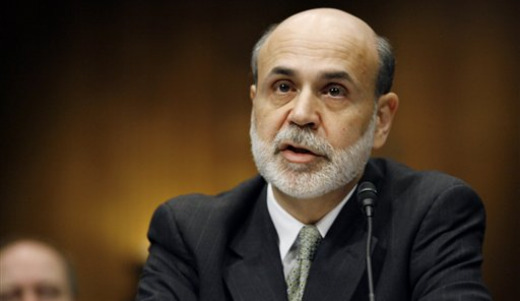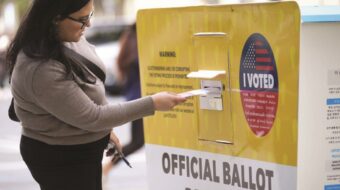
Why are people on the left like Bernie Sanders, the independent Vermont senator known as a socialist, Campaign for America’s Future co-director Robert Borosage and economist Dean Baker teaming up with notorious right-wingers like Grover Norquist and Phyllis Schlafly?
A left-right coalition including Borosage, Baker, Norquist and Schlafly sent a letter to members of the Senate Dec. 2 calling for an audit of the Federal Reserve before any vote on re-appointing Ben Bernanke as chairman of the Board of Governors of the Federal Reserve. Other signers included left FireDogLake blogger Jane Hamsher and libertarian John Tate. The letter coincided with the announcement that Sen. Sanders was putting a hold on the Bernanke nomination.
Why are elements of the left, and right, ends of the political spectrum united on this?
The answer, in essence, concerns one’s attitude toward the independence of the Federal Reserve, and the fundamental purpose of a central bank in any economy.
Even though the chairman and the Board of Governors of the Federal Reserve are appointed by the president for 14-year terms to oversee the Federal Reserve System of Banks, the Federal Reserve Banks are private, and led by representatives of member banks, along with representatives from commercial, industrial, agricultural and labor communities.
The Fed was created in 1913 by the enactment of the Federal Reserve Act, largely as a response to a series of financial panics or bank runs. Over time, the roles and responsibilities of the Federal Reserve System have expanded and its structure has evolved. Events such as the Great Depression were some of the major factors leading to changes in the system. Its duties today fall into four general areas:
1. Conducting the nation’s monetary policy by influencing monetary and credit conditions in the economy in pursuit of maximum employment, stable prices, and moderate long-term interest rates
2. Supervising and regulating banking institutions to ensure the safety and soundness of the nation’s banking and financial system, and protect the credit rights of consumers
3. Maintaining stability of the financial system and containing systemic risk that may arise in financial markets
4. Providing financial services to depository institutions, the U.S. government and foreign official institutions, including playing a major role in operating the nation’s payments system.
According to the Board of Governors: “It [the Fed] is not ‘owned’ by anyone and is ‘not a private, profit-making institution’. Instead, it is an independent entity within the government, having both public purposes and private aspects.” In particular, neither the Federal Reserve System nor its component banks are owned by the U.S. Government.
The Fed has reserved the right to restrict exposure of details of some transactions, even to congressional committees, to avoid instability in financial markets, especially in times of panic. The demand for accounting by liberal economist Dean Baker, for example, seeks to expose possible incestuous relations between the Fed and the banks it supervises. Baker and many on the left also seek to hold Bernanke accountable for not taking steps to prevent the financial crisis in the years leading up to the current crash.
Both libertarian and some left trends view the Federal Reserve as in general simply a tool of the banking sector – which for some ends the discussion.
The libertarian arguments, however shamelessly, hark back to the Confederate-era arguments against a national banking system, which pro-slavery forces viewed as a tool of Northern aggression against Southern, states-rights, slave and land based economic regimes. Thomas Jefferson and Andrew Jackson were ardent anti-banking presidents. Anti-Semitism and anti-bank sentiment are also often entangled in right-wing arguments.
Many on the left see bank nationalization as the correct immediate solution to the financial crisis, and, if banks are nationalized, some think there would be no need for an “independent” Fed at all, and certainly not headed by someone whose chief constituency after the president has been the private banking industry.
However, contrary to Sen. Sanders, and Phyllis Schafly, and Dean Baker, and others, I support the reappointment of Chairman Ben Bernanke. It’s true he did not act decisively until the crisis was in full bloom. Perhaps there is time to make a list of all who would have done otherwise. But character is often tested and reborn IN a crisis, and Bernanke passes the test there. Few understood the dimensions of a great financial crisis as he did. He acted creatively and decisively and it is due to his and others’ efforts in no small measure that we have a CHANCE to escape a second Great Depression. A collapse of the financial system, which was only narrowly averted, would have placed recovery in much greater peril. Unemployment figures could easily have been double what they are now. And the danger, though receded slightly, is not over. Was too much paid when the Fed assumed assets of AIG, Morgan Stanley, Bear Stearns and others? Perhaps – time will tell for sure – but there was no luxury of lengthy consideration available.
The banking system will doubtless undergo much increased regulation and supervision in the coming period, but it is unlikely to be fully nationalized. Further, merging the Fed into a tighter embrace by political institutions has at times had the effect of promoting fiscal folly by kings, general secretaries, presidents and prime ministers. So, like most modern central banks, it will remain more or less independent.
I lean toward agreement with another view, expressed by Sen. Chris Dodd, D-Conn., and incorporated into his financial reform bill in the Senate Finance Committee, that the public oversight of investment banking should be in a new, non-bank-based authority, and not reside under the Fed. Extending the Fed’s authority to such an extent risks making the central bank itself a “too big to fail” enterprise.
The Fed should get the increased resolution authority it needs to take ownership of failed banks, but it should stay focused on monetary policy, not investment policy, as Dodd’s proposal recommends. And Bernanke should stay chair. He has learned much from his mistakes – as could we all.
Photo: Federal Reserve Chairman Ben Bernanke testifies on Capitol Hill, Dec. 3, before the Senate Banking Committee hearing on his renomination. (AP/Jose Luis Magana)












Comments